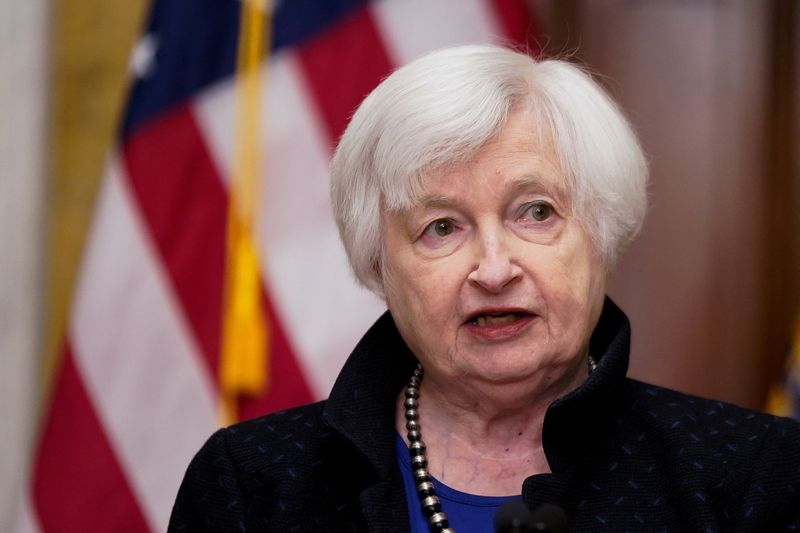By Andrea Shalal and David Lawder
WASHINGTON (Reuters) - Treasury Secretary Janet Yellen said on Monday that a failure by Congress to raise the $31.4 trillion federal debt limit would cause a huge hit to the U.S. economy and weaken the dollar as the world's reserve currency.
Asked whether the U.S. Treasury could prioritize payouts to bondholders in the event of a default, Yellen told CNBC that President Joe Biden would be forced to make decisions on what to do with Treasury's resources if the debt ceiling was not raised, but declined to discuss or rank the options.
"There are a variety of different options, but there are no good options. Every option is a bad option," she said. "The only option that really leaves our economy in good shape - and our financial system - is raising the debt ceiling."
She said Biden hoped to establish a process for discussing and compromising on fiscal-policy issues and his budget proposal with congressional Republicans but would not do it "with a gun" to his or the American people's heads.
Biden insists that Congress has a constitutional duty to raise the debt ceiling, which reflects previously spent federal money, without conditions, but Republicans have tied any increase to sweeping budget cuts that Democrats oppose.
Biden will meet on Tuesday with Republican House Speaker Kevin McCarthy, Senate Minority Leader Mitch McConnell and top congressional Democrats at the White House to try to break the impasse.
Yellen conceded there was "a very big gap" between Biden's position and that of many Republicans, warning that their proposed spending cuts were "draconian."
Risking default to secure budget cuts could bring "enormous harm to American households," and even the current brinkmanship would harm financial markets and could jeopardize U.S. government credit ratings and undermine the U.S. currency.
"The dollar is regarded - and Treasury securities - as the bedrock safe asset in the entire global financial system," she said. "It's trusted, and it is the ultimate safe asset and a failure to raise the debt ceiling, impairing the U.S. credit rating, would put that at risk. So that is a real concern.
Yellen told lawmakers last week that Treasury will likely be unable to pay all the government's bills as early as June 1 without an increase in the federal debt limit.

Yellen, other economists and analysts have repeatedly warned that a default on U.S. debt would result in millions of job losses, while driving household payments on mortgages, auto loans and credit cards higher.
Unlike most other developed countries, the U.S. puts a hard limit on how much it can borrow. Because the government spends more than it takes in, lawmakers must periodically raise the debt ceiling.